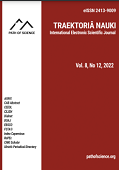Modern Cognitive Approach to Learning Translation
Modern Cognitive Approach to Learning Translation
Author(s): Nigar Ogtay BabayevaSubject(s): Cognitive linguistics, Sociology of Culture, Translation Studies
Published by: Altezoro, s. r. o. & Dialog
Keywords: translation; cognitive; translator; vocabulary; interpretation;
Summary/Abstract: In the lingo-cultural environment, the language landscape of the world is a means of expression of cultural stereotypes, symbols and standards that shape society. The national mentality is one of the main aspects of language thinking. Therefore, studying the transmission of national-cultural characteristics of the original text in the translation process plays a crucial role in intercultural communication. The breadth of theoretical concepts and research methods characterises modern translation studies. Especially in recent years, there has been an increasing interest in translation. Traditional translation has long been influenced by structural linguistics. In modern times, new perspectives on translation creativity have emerged. Cognitive approaches, in particular, have gained popularity among researchers in recent years. The development of translation studies demonstrates that translation, like any form of transfer, can never be flawless. Consequently, no translation can be the same as the original. This indicates that the translator should be concerned with interpreting the source text and its creation in the translated language. Translators should not limit themselves to just familiarising themselves with the vocabulary of the target language but should also study the ethnocultural and psycholinguistic aspects of language carriers. In doing so, they will encounter fewer problems and avoid embarrassing situations. Usually, gross errors appear in machine translation, mainly when translating personal names as common nouns rather than anthroponyms.
Journal: Traektoriâ Nauki
- Issue Year: 9/2023
- Issue No: 6
- Page Range: 1021-1028
- Page Count: 8
- Language: English

